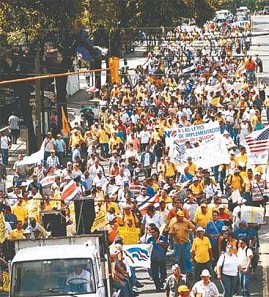 Picture from Diario Extra (Tuesday November 27, 2007)
Picture from Diario Extra (Tuesday November 27, 2007)costa rica • cafta • archivos de los protestos globales • www.agp.org
UN Human Rights Body Gives Credence to Costa Rica's "No" Coalition
 Picture from Diario Extra (Tuesday November 27, 2007)
Picture from Diario Extra (Tuesday November 27, 2007)
A national Strike has been called beginning today by the Electric and Telecommunications workers (ICE). We will try to provide information about what is happening in that respect.
Meanwhile in Geneva:
UN Human Rights Body Gives Credence to Costa Rica's "No" Coalition:
Government Advised to Assess the Impact of CAFTA-DR on the Enjoyment of Economic, Social and Cultural Rights
/Geneva//, 26 November 2007/ -Worried about the impact of CAFTA-DR on human rights? So are the guardians of the International Covenant on Economic, Social and Cultural Rights. During the recent appearance of Costa Rica before the Committee on Economic, Social and Cultural Rights, Committee members raised concerns about the effects of the Dominican Republic-Central America-United States Free Trade Agreement (CAFTA-DR) on various economic, social and cultural rights in Costa Rica, including the rights to health, social security, food and water. In its final recommendations to the Costa Rican government, made public today, the UN Committee advised the Costa Rican government to seriously assess the potential adverse impacts of its commitments under CAFTA-DR "particularly on traditional agriculture, labour rights, access to health, social security, and the intellectual property regimes protecting, /inter alia/, access to medicines, biodiversity, water and the right of indigenous communities to these resources."
These recommendations add the Committee's authoritative weight to concerns long posed by human rights activists and the large percentage of the Costa Rican population who oppose the agreement.
CAFTA-DR was narrowly ratified through a referendum in Costa Rica on 7 October 2007 amidst accusations of electoral fraud, and to the dismay of the many experts who are concerned about the likely negative social and economic impacts of CAFTA-DR. The Agreement will only enter into force when the National Assembly has approved eleven laws relating to its implementation.
The "No" coalition, which represents the wishes of almost half of the country's population, have repeatedly pointed, inter alia, to the dangers of the new intellectual property regime CAFTA-DR imposes, which will require changes in patent law that the National Pharmaceutical Industry estimates will cause medicine prices to rise by at least 800%. At present, access to health services is virtually universal in Costa Rica, in large part due to existing patent legislation which enables the production of generic medicines and thus ensures that even the poorest sections of the population are able to afford necessary drugs. CAFTA-DR will change all this, through intellectual property provisions that will dramatically limit Costa Rica's ability to manufacture, sell or import generic medicines.
In response to questions posed by the Committee during the review on 6 and 7 November 2007, the delegation stressed that the Costa Rican government had undertaken a human rights impact assessment of CAFTA-DR and was aware of the potential negative effects of the agreement on certain sectors of the population. The State confirmed that implementation would be carefully monitored, and social compensation distributed where necessary. Despite these vague assurances, the delegation failed to respond concretely to the majority of the Committee's questions regarding CAFTA-DR, suggesting that the government has not fully taken into account the effect of the free trade agreement on its human rights obligations.
As State party to the International Covenant on Economic, Social and Cultural Rights, the Costa Rican government is legally bound to ensure that it does not regress on any of its human rights obligations. Following this session before the UN Committee, the government must be held to account and provide its citizens with proof of the human rights impact assessment it claims to have carried out, as well as policy and budgetary evidence of measures it is implementing to ensure that CAFTA-DR will not lead to a regression on the enjoyment of economic, social and cultural rights in the country.
On Monday the 26 there was a one day strike in Costa Rica called by the unions of ICE, the Telecommunications and Electric Company. In the assembly which was a part of the day's activities, the decision was made to prepare letters which were presented to the Legislative Assembly and the President of ICE. There was a march which carried the letters to the Assembly.
It was decided that the strike would only be for one day, but notice was given that if the pending bill which would effectively lead to a privatization of Telephone and Electric services was passed, an immediate long term strike would be called, similar to what happened in 2000, which prevented the privatization at that point.
Apparently the feeling was that this threat would be enough to stop the bill from moving forward in the Assembly. At this point, it is hard to predict what will happen.
To read the two letters (in Spanish):
1. Carta a los Diputados de la Asamblea Legislativa
 http://www.art-us.org/node/305
http://www.art-us.org/node/305
2. Carta al Presidente de ICE  http://www.art-us.org/node/306
http://www.art-us.org/node/306
costa rica | tlc | www.agp.org (archives) | www.all4all.org